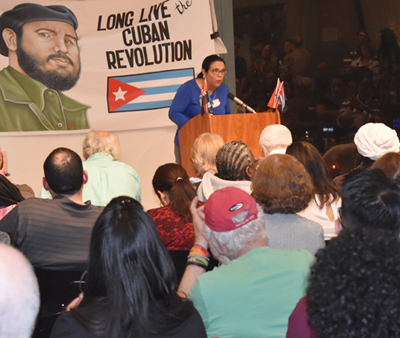
Vol. 81/No. 14 April 10, 2017
(front page)
NY meeting: ‘End US embargo of Cuba! Get out of Guantánamo!’

“Cuba and the United States have established diplomatic relations,” she said. “But the U.S. government still maintains a blockade against our country, still illegally occupies Guantánamo, and still has policies aimed at ‘regime change’ in Cuba.
“We will never renounce the construction of a socialist Cuba,” Ramírez concluded to applause.
The ICAP leader was speaking to more than 200 people from New York and across the U.S. and Canada at a public meeting at the Malcolm X and Dr. Betty Shabazz center in Harlem. The March 25 event was part of a two-day conference organized to advance the fight to demand Washington end its 55-year-old embargo of Cuba; get out of Guantánamo, Cuban territory that Washington has illegally occupied since 1903; and end all efforts aimed at “regime change” in Cuba. An article on the conference discussion, debate and decisions will appear next week.
The meeting opened with a dinner, to the sounds of drumming by Afro-Boricua Bomba Yo.
The program was co-chaired by Estela Vasquez, an executive vice president of 1199SEIU healthcare workers union, and August Nimtz of the Minnesota Cuba Committee. In opening the program, Vasquez recognized several special guests, including Anayansi Rodríguez, Cuba’s ambassador to the United Nations; Miguel Barnet, president of the Union of Writers and Artists of Cuba (UNEAC); and members of a leadership delegation of the Federation of Cuban Women to the U.N. Commission on the Status of Women.
In addition to Ramírez, speakers included Rafael Cancel Miranda, a longtime Puerto Rican independence leader imprisoned for more than 25 years by the U.S. colonial rulers; Andrés Gómez, a coordinator of the Antonio Maceo Brigade, a Cuban-American organization based in Miami that has organized support of the Cuban Revolution for four decades; and Juanita Young, whose son Malcolm Ferguson was killed by New York police in 2000.
Ramírez reminded participants that in 1960 when Fidel Castro came to New York to address the U.N. General Assembly on behalf of the newly victorious revolution, downtown hotels insulted and evicted the Cuban delegation. At Malcolm X’s initiative, the Cubans were invited to stay at the Hotel Theresa in Harlem. Thousands poured into the streets to welcome the Cuban revolutionaries.
Turning to the evening’s honored guest, Rafael Cancel Miranda, the ICAP leader underlined revolutionary Cuba’s support “for a free and independent Puerto Rican nation.”
In his remarks, Cancel Miranda said that although the United States “invaded Puerto Rico and still occupies my country, we are going to fight back until we have ended the colonial slavery of my people.
“And when I say ‘my people,’ I’m also Cuban. I’m Venezuelan. I’m from Bolivia. I’m from the Caribbean. I’m Puerto Rican from top to bottom, but I’m all of that too.” He paid tribute to American Indian Movement leader Leonard Peltier and Black Panther Herman Bell, with whom he served time in federal prison and who are still behind bars.
“Anybody that stands up and fights is my people,” he said. “You’re not wasting your time. Fighting for others make all of us more human. Anyone who has dignity supports the Cuban Revolution,” the Puerto Rican leader said. “Anyone who cares.”
Responding to the presentation of a bouquet, Ambassador Rodríguez thanked participants for the “selfless solidarity we have received all these years. What Cuba has achieved,” she said, “has been done by the revolution itself, by the Cuban people, a heroic people, a resilient people who’ve resisted under the most difficult circumstances.
“But we couldn’t have done it without the help, the support, the love of all of you,” she said. “Particularly here in the United States,” whose government “has imposed an unjust, illegal, and unfair blockade against us, which is still there” despite the establishment of diplomatic relations.
U.S. policy has failed for more than five decades, said Andrés Gómez, “because of the determination of the Cuban people to defend their socialist revolution and to continue to fight for a just society.”
Describing the work in Miami by the Antonio Maceo Brigade, which marks its 40th anniversary this year, Gómez said it was an honor to be at the conference. “Our job here,” he said, “is to fight to end the U.S. policy of permanent aggression against Cuba.”
Juanita Young spoke about the trip she and other family members of victims of cop killings and brutality took to Cuba last year. They joined the massive May Day demonstration in Havana, met with a member of the Cuban Five and took part in other activities.
“If I’d been living in Cuba,” Young said, “I wouldn’t be standing here talking about the death of my son.”
Pointing to the human solidarity she and others had experienced, Young concluded, “Cuba, I’ll take you any time. You all need to visit Cuba, I’m telling you!”
Cultural performances by Bomba Yo and Cuban Latin jazz pianist Marcello Casagrandi closed the evening.
Related articles:
Workers, youth from 23 countries to join Cuba Brigade
Front page (for this issue) | Home | Text-version home